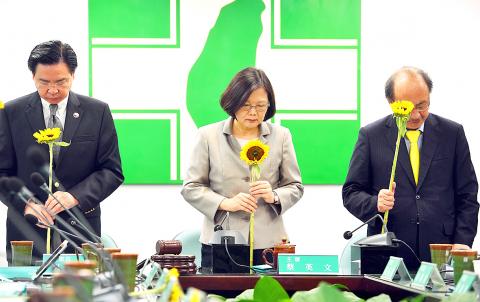Democratic Progressive Party (DPP) Chairperson Tsai Ing-wen (蔡英文) said that she would develop cross-strait ties according to the constitutional framework of the Republic of China (ROC) if she wins next year’s presidential election, the party said yesterday.
“Tsai has made it very clear that she will continue to push for peaceful and stable development across the Taiwan Strait based on public opinion and the fruits accumulated from cross-strait exchanges over the past two decades under the framework of the ROC constitutional system,” DPP spokesperson Cheng Yun-peng (鄭運鵬) said.
“We will make sure that Taiwan remains democratic and can make decisions on its own, and that cross-strait exchanges are democratic and transparent,” Cheng said.

Photo: Lo Pei-der, Taipei Times
Cheng made the remarks following criticism from China’s Taiwan Affairs Office spokesman Ma Xiaoguang (馬曉光), who said Tsai, in a speech at the Center for Strategic and International Studies (CSIS) during her US visit this month, failed to mention the “most important issue at the core” of cross-strait ties.
“Opposing Taiwanese independence and insisting on the [so-called] 1992 consensus are the basis of peaceful developments in cross-strait relations,” Ma told a press conference in Beijing earlier yesterday. “The core value is to agree that mainland China and Taiwan both belong to one China, and cross-strait relations are not nation-to-nation relations.”
“The DPP should clearly define what cross-strait relations are,” he added.
The “1992 consensus” refers to a tacit understanding between the Chinese Nationalist Party (KMT) and the Chinese Communist Party (CCP) that both Taiwan and China acknowledge there is “one China,” with each side having its own interpretation of what “China” means.
In 2006, then-KMT lawmaker Su Chi (蘇起) said that he created the term in 2000, when he was Mainland Affairs Council chairman.
Ma said that the “1992 consensus” should not be narrowly defined as a consensus accepted by the KMT and the CCP, and is not an “abstract concept or a historical term.”
“The term represents the basic attitude of both sides on the one China principle. It is because of this basic attitude that both sides are able to allow for differences while pursuing the same goals, as well as setting aside disputes to commence discussions,” Ma said.
Any changes to the core spirit of the “1992 consensus” removes any valid basis to the peaceful and stable development of cross-strait relations, Ma said, adding that the DPP must clearly respond and define what cross-strait relations are, on what basis such relations are carried out, and how peaceful and stable development should be maintained.
Ma also panned the US government and said its actions were not conducive toward the peaceful and stable development of ties across the strait.
The US should hold to the “one China” policy and their recognition of the principles behind the three communiques, Ma said, adding that “the US should not be sending the wrong signals to Taiwanese independence forces.”

The National Immigration Agency (NIA) said yesterday that it will revoke the dependent-based residence permit of a Chinese social media influencer who reportedly “openly advocated for [China’s] unification through military force” with Taiwan. The Chinese national, identified by her surname Liu (劉), will have her residence permit revoked in accordance with Article 14 of the “Measures for the permission of family- based residence, long-term residence and settlement of people from the Mainland Area in the Taiwan Area,” the NIA said in a news release. The agency explained it received reports that Liu made “unifying Taiwan through military force” statements on her online

A magnitude 5.7 earthquake struck off Taitung County at 1:09pm today, the Central Weather Administration (CWA) said. The hypocenter was 53km northeast of Taitung County Hall at a depth of 12.5km, CWA data showed. The intensity of the quake, which gauges the actual effect of a seismic event, measured 4 in Taitung County and Hualien County on Taiwan's seven-tier intensity scale, the data showed. The quake had an intensity of 3 in Nantou County, Chiayi County, Yunlin County, Kaohsiung and Tainan, the data showed. There were no immediate reports of damage following the quake.

Tung Tzu-hsien (童子賢), a Taiwanese businessman and deputy convener of the nation’s National Climate Change Committee, said yesterday that “electrical power is national power” and nuclear energy is “very important to Taiwan.” Tung made the remarks, suggesting that his views do not align with the country’s current official policy of phasing out nuclear energy, at a forum organized by the Taiwan People’s Party titled “Challenges and Prospects of Taiwan’s AI Industry and Energy Policy.” “Taiwan is currently pursuing industries with high added- value and is developing vigorously, and this all requires electricity,” said the chairman

Actor Darren Wang (王大陸) is to begin his one-year alternative military service tomorrow amid ongoing legal issues, the Ministry of the Interior said yesterday. Wang, who last month was released on bail of NT$150,000 (US$4,561) as he faces charges of allegedly attempting to evade military service and forging documents, has been ordered to report to Taipei Railway Station at 9am tomorrow, the Alternative Military Service Training and Management Center said. The 33-year-old would join about 1,300 other conscripts in the 263rd cohort of general alternative service for training at the Chenggong Ling camp in Taichung, a center official told reporters. Wang would first